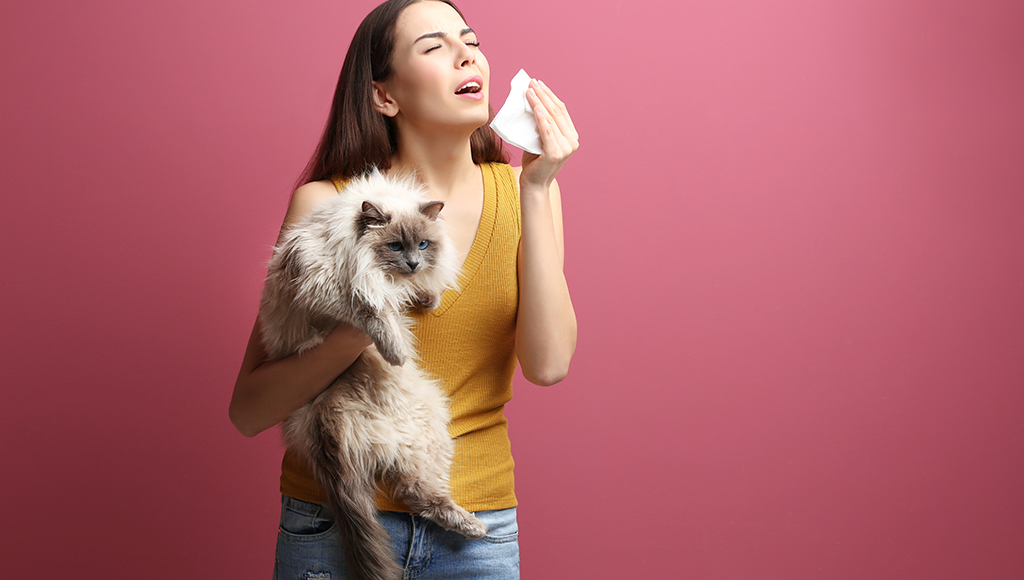Owning a Cat When You Have Allergies
Before deciding you cannot have a cat, check with your doctor first and pinpoint exactly what causes your allergy.

If you or someone you live with is allergic to cats, you may think that you can never own one; however, this is far from the truth. The benefits of having a pet usually outweigh the drawbacks of pet allergies for many people. You'd be surprised to know how many people, with non-life-threatening allergies, live with pets despite having allergies to them! There are several ways to manage your cat allergies and if you, like many other people, prefer not to be tied down to a regimen of drugs and sprays, it is still possible to own your very own furry companion.
Any and all cats and dogs may cause reactions for people who are allergic to animals. Cats tend to cause more reactions than dogs for allergic people, although some people are more sensitive to dogs than cats. Contrary to popular belief, there are no "non-allergenic" breeds of dogs or cats; even hairless breeds may cause symptoms.
PINPOINT YOUR ALLERGY
There are many people who want to own a cat, but their battle with allergies stands in their way. Pet allergies are one of the most predominant allergies in humans. There are several known causes for allergies related to cats. The two most common causes involve the dander shed by pets by when they shed their fur, and a glycoprotein known as Fel d 1, which is secreted by the cat’s sebaceous glands and then transmitted by their saliva, when it gets into their fur as they groom themselves.
Before you start looking for your new cat, check with your doctor first and pinpoint exactly what causes your allergy. This will help you to figure out what kind of cat to get; if it’s an allergy to fur for example, go for a cat with less fur or even none! If your allergy is caused by saliva on the other hand, look at breeds like the Siberian with less of the allergen in their saliva. Keep in mind too that some people can become desensitized to their own allergy if they are willing to suffer some discomfort for a while. For example, what may start out as a serious allergy, with eyes seemingly swollen shut, over time may turn into simple excess watering of the eyes or a slight runny nose.
PICKING THE RIGHT BREED
To have the greatest success it's important to choose the right breed of cat to own. Several breeds of cat have far fewer allergy inducing dander and skin than other breeds. Cats that are safer for owners include Cornish Rexes, LaPerm, Oriental Shorthairs, and Devon Rex. These breeds are safer to own than other breeds when you are allergic to dander, because their fur has fewer layers. This means that there is less dander and less fur to fly around, so people with dander allergies are able to tolerate them much better.
The Sphinx cat, which is nearly hairless is one of the most popular breeds for people with dander allergies, while the Siberian is less likely to cause allergies for people allergic to the glycoprotein found in the saliva and skin, because their saliva has very low levels of Fel D1. There are no hypoallergenic cats; cats that have been bred to show distinctive hypoallergenic traits, such as a lack of the allergy causing protein or different fur. Be wary of breeders or pet shops who make this claim.
WHAT YOU CAN DO:
1. Create an area in your home that is "allergy free", preferably a bedroom or other room where pets are expressly forbidden and denied access. Keep the air clean in this room using a HEPA air cleaner.
2. Use HEPA air cleaners throughout the rest of the home, and avoid furnishings where dust and dander can more easily accumulate, such as cloth curtains and blinds and carpeted floors. Clean these areas frequently and thoroughly to remove dust and dander and prevent accumulation of these allergens. Frequently wash couch covers, pillows, curtains, area rugs and pet beds.
3. Bathing your pet on a weekly basis can greatly reduce the level of allergy-causing dander (shed old skin cells). Cats can get used to being bathed, but it's critical to only use products labeled for them; kittens may need a shampoo safe for kittens. Check with your veterinarian's staff or a good book on pet care for directions about safe bathing, It is also a good idea to use a shampoo recommended by your veterinarian or other animal care professional.
Ready to start saving money on pet wellness care?
Then take a look at Mint Wellness, the pet wellness plan that provides fast reimbursement on routine pet care. Save on vaccinations, wellness exams, preventatives, dental, and more!
Learn More


